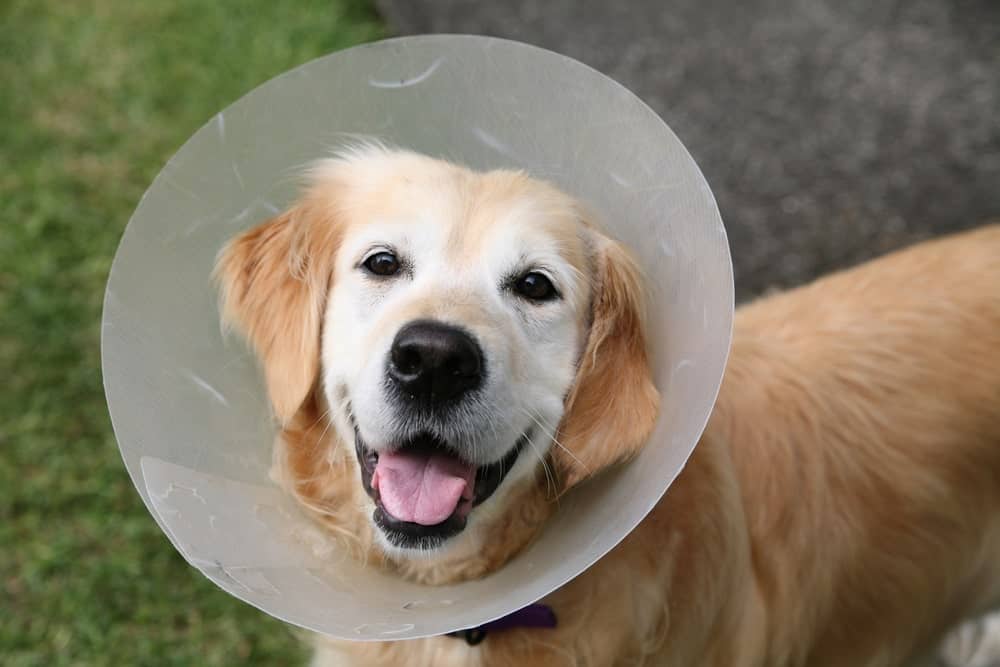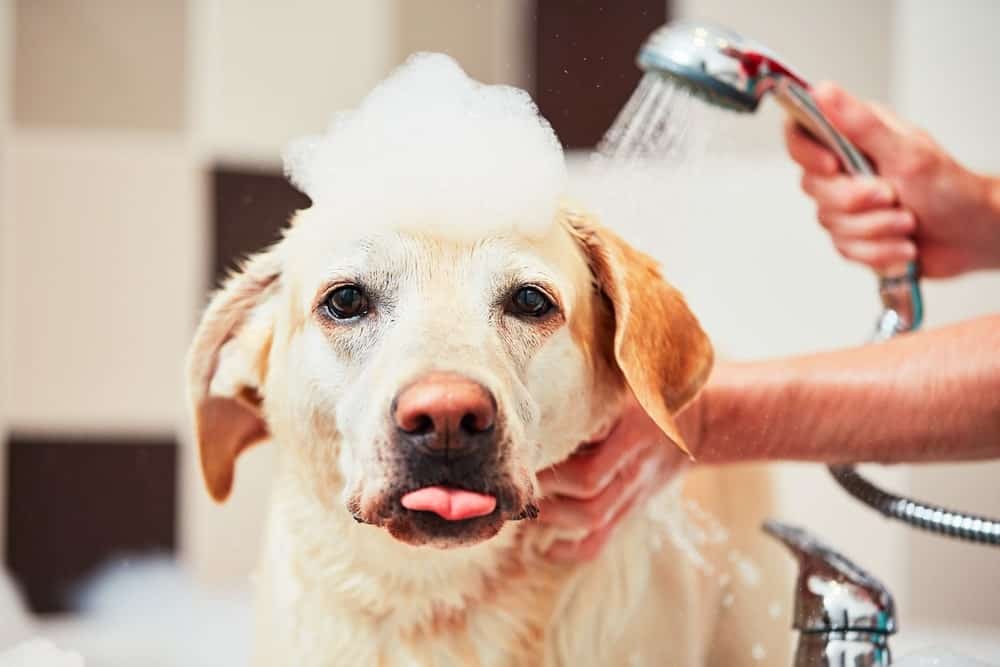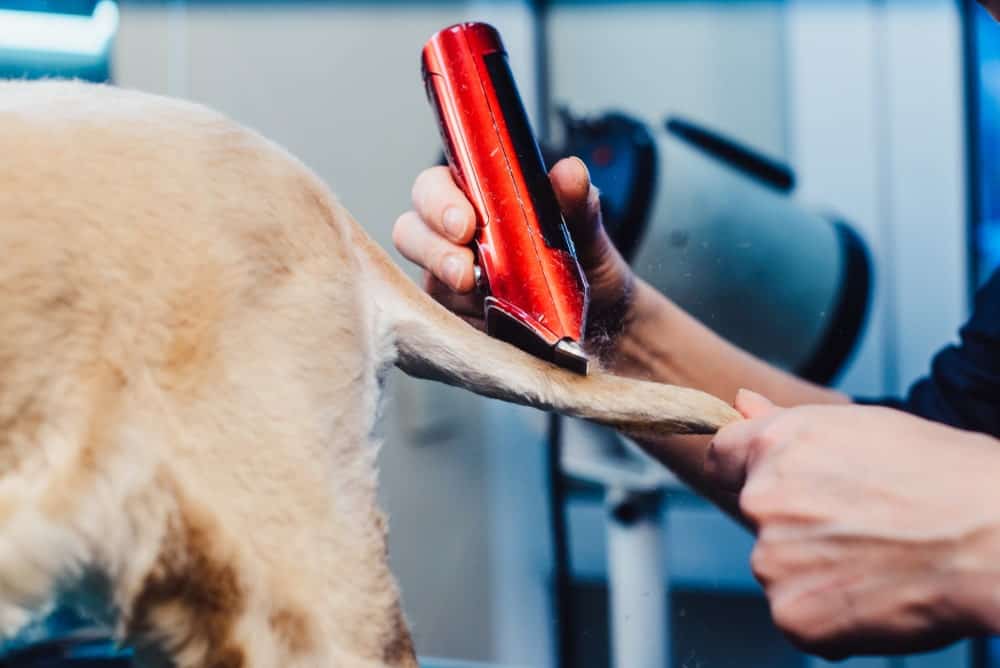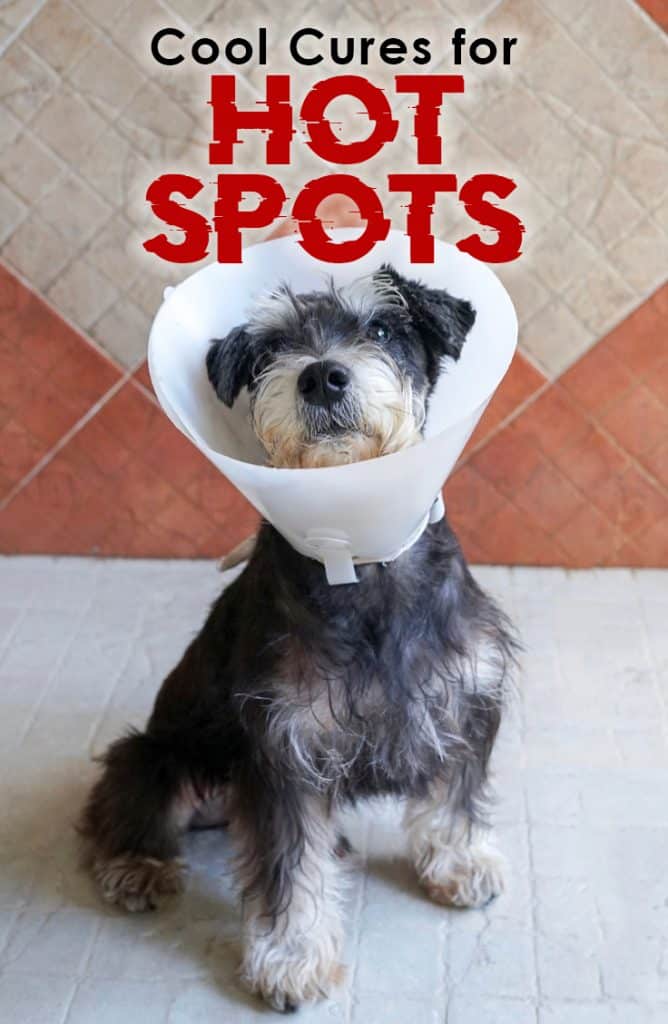“This post contains affiliate links, and I will be compensated if you make a purchase after clicking on my links.”
While hot spots can be alarming to owners and painful for dogs, they can be treated at home! Here’s how.

A hot spot, also known as acute moist dermatitis, generally refers to a painful, itchy, aggravating skin condition in dogs that involves a localized area of the skin becoming inflamed or infected. A hot spot lesion typically looks like a moist and oozing or seeping, reddened spot that is not only intensely itchy but also rather painful for the dog.
How are Hot Spots Detected
The hallmark signs of hot spots are oozing, redness, itchiness, pain, and hair loss in a single area of a dog’s skin. Common locations for hot spots are the face, behind the ears or on cheeks, paws, arms, legs, and the base of the tail – places where the dog has the ability to scratch, chew, or lick excessively. Hot spots are notoriously fast to develop, often appearing out of nowhere and tripling in size over just a few hours.
So, what causes hot spots?
In over-simplified terms, it can be said that dogs cause their own hot spots by repeatedly licking or chewing on an area of their body.
What usually starts as an irritant on the dog’s skin – a bug or flea bite, bee sting, allergies, a scrape or nick, itchiness from being groomed – can very quickly evolve into a hot spot when a dog continually licks or chews the irritated, itchy area. In some cases, dogs develop hot spots as a result of stress or boredom-related chewing and scratching. The irritant itself doesn’t cause a hot spot, but rather the damage to the skin and exposure to bacteria as a result of excessive scratching and chewing create the perfect environment for a hot spot to develop. When damaged or broken skin and exposure to bacteria combine in a warm, moist environment, an infection can quickly take hold.
Can hot spots be prevented?
The very best treatment plan is always prevention. If a dog is prone to hot spots, determine the root cause – eliminate fleas, change the dog’s diet (many pet parents report less frequency of hot spots when a dog is switched to a grain free dog food) or use different grooming products.
If boredom or stress is causing the dog to scratch and chew, increase exercise or find ways to ease stress. Consider the use of anti-itch sprays or creams to prevent irritation from developing into a full-fledged hot spot. If the dog is excessively chewing or scratching an area of their skin, limit their access to that area with an elizabethan collar (the cone of shame) or even a t-shirt or sock.
While any dog can get a hot spot, certain breeds are more susceptible. Dogs with thick, heavy coats – Golden Retrievers, Labradors, German Shepherds, St. Bernards and Collies – are known to experience hot spots more frequently because their fur tends to trap moisture on the skin.

Can I treat a hot spot at home?
Despite our best efforts, most dogs will still experience at least a hot spot in their lifetime. The most important step in healing a hot spot that’s already developed is keeping the area dry and preventing the dog from further damaging the skin. Hot spots almost always result in hair loss in the affected area. However, any fur that remains on or around the hot spot should be removed using dog grooming clippers. Exposure to air is vitally important to the healing process.
Next, the area should be thoroughly cleaned with warm water and an antibacterial soap or shampoo. You can easily clean a hot spot by creating your own “surgical scrub” at home with a bowl of warm, soapy water and a sterile gauze pad. Because the area is intensely itchy, your dog may even enjoy having his hot spot cleaned. Once cleaned, use more sterile gauze to thoroughly dry the area. For very large, seeping hot spots, some veterinarians recommend wiping the area with an alcohol pad or wipe (with 70% isopropyl alcohol) to assist in drying.
Limit the dog’s access to the area with a cone or creatively placed clothing.
How long does it take a hot spot to heal?
The steps above should be repeated twice daily for a few days. After a few days, the hot spot should no longer be inflamed or seeping. Instead, it will appear dry and may begin to form a (sometimes black) flakey scab. Once the area is no longer moist, discontinue the steps above and begin using a hot spot cream or salve until the area has completely healed.
During the entire healing stage, your dog will find it irresistible. Watch closely to be sure he doesn’t scratch, chew, or further irritate the healing wound. Continue using a cone until the area is healed or your dog can reliably leave it alone.

Should I visit a veterinarian?
If, at any point, your dog develops a fever (Not sure how to take your dog’s temperature? This guide will help!), lethargy, or other unusual symptoms, or, if the hot spot doesn’t begin to heal after a few days of following the treatment plan above, continues to get larger, or shows signs of infection (pus, swelling, or redness that doesn’t improve) a call to the veterinarian is in order.
For severe hot spots or secondary infections that develop, a veterinarian will most often prescribe an antibiotic or steroid (or combination) to assist in healing.
Many pet parents have their own tried-and-true methods for healing a hot spot quickly. Some swear by tea bag compresses, original Listerine washes, medicated powders, and cortisone creams. Consult a veterinarian before applying any medicated lotions, creams or powders to your dog’s skin that aren’t created specifically for dogs.
Found this article helpful? Pin it!

Do you have a favorite hot spot remedy? Please, share it in a comment below!



















Cheryl Gavette
Feb 24, 2022 at 2:54 pm
I have had two Westies. Their hot spots went away when I decreased their protein intake (cheese,cottage cheese,meat).
Jeff Williams
Sep 22, 2019 at 6:13 pm
I use 2 black tea bags in 6 oz’s of water and let cool making sure you remove the hair prior to applying at least 3 to 4 times aday